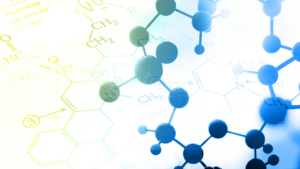Matrix-Assisted Laser Desorption/Ionization (MALDI) is an ionization technique used in Mass Spectrometry (MS) for analyzing large biomolecules and polymers. It facilitates the ionization and desorption of analytes without significant fragmentation.
Principles:
- Matrix Preparation: A sample is mixed with an organic matrix, often a crystalline compound such as alpha-cyano-4-hydroxycinnamic acid (CHCA) or sinapinic acid. The matrix helps to absorb laser energy, assist in desorption, and enhance ionization.
- Laser Irradiation: The matrix-analyte mixture is exposed to a pulsed laser beam. The absorbed laser energy causes the desorption and ionization of the analyte molecules from the matrix.
- Ionization: The desorbed analyte molecules become ionized, forming gas-phase ions that can be detected by the mass spectrometer.
Applications:
- Proteomics: Used extensively for the analysis of proteins, peptides, and large biomolecules, enabling protein identification, sequencing, and structural analysis.
- Biomolecule Analysis: Suitable for analyzing large molecules like nucleic acids, lipids, carbohydrates, and polymers due to its soft ionization method.
- Clinical Diagnostics: Applied in clinical laboratories for biomarker discovery, identifying disease-related molecules, and drug metabolite analysis.
Strengths:
- Soft Ionization: Gentle ionization technique that minimizes fragmentation, preserving the molecular structure during analysis.
- High Sensitivity: Provides high sensitivity and specificity for large biomolecules and polymers.
- Molecular Weight Determination: Allows accurate determination of the molecular weights of large molecules and complex mixtures.
Limitations:
- Matrix Interference: Matrix peaks might overlap with analyte peaks, complicating analysis and interpretation of mass spectra.
- Sample Preparation: Requires careful sample preparation to ensure proper crystallization and uniform distribution of the matrix-analyte mixture.
- Limited Mass Range: Suitable primarily for the analysis of large biomolecules and polymers, limiting its application to smaller molecules.
- Sensitivity to Matrix and Sample Quality: Sensitivity to matrix and sample quality can affect reproducibility and accuracy.
In summary, Matrix-Assisted Laser Desorption/Ionization (MALDI) is a valuable technique for the analysis of large biomolecules and polymers in various fields, especially in proteomics and biomarker discovery. Its strengths include gentle ionization, high sensitivity, and molecular weight determination. However, limitations involve matrix interference, sample preparation requirements, limited mass range, and sensitivity to matrix and sample quality. Nonetheless, MALDI remains a crucial tool in the analysis of biomolecules in biological and clinical research.
In summary, Matrix-Assisted Laser Desorption/Ionization (MALDI) is a valuable technique for the analysis of large biomolecules and polymers in various fields, especially in proteomics and biomarker discovery. Its strengths include gentle ionization, high sensitivity, and molecular weight determination. However, limitations involve matrix interference, sample preparation requirements, limited mass range, and sensitivity to matrix and sample quality. Nonetheless, MALDI remains a crucial tool in the analysis of biomolecules in biological and clinical research.


 MS – Mass Spectrometry
MS – Mass Spectrometry